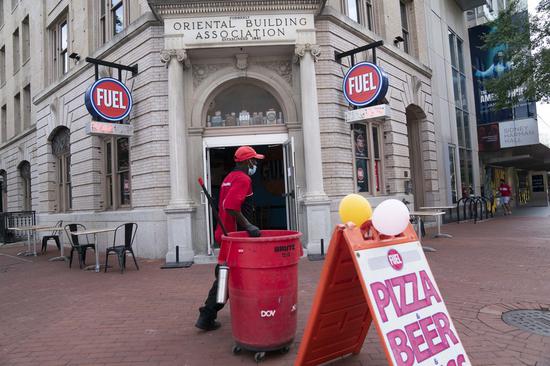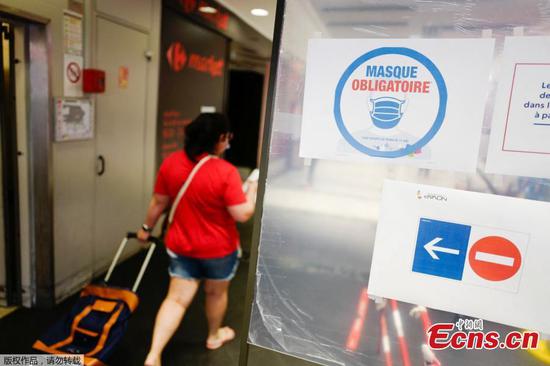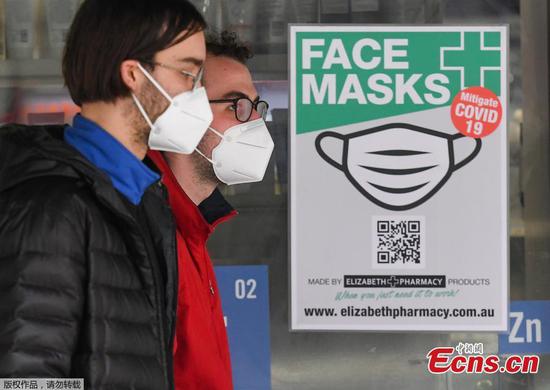
A cleaner walks past a reopened restaurant in Washington D.C., the United States, July 17, 2020. (Xinhua/Liu Jie)
The number of initial jobless claims in the United States rose to 1.4 million last week amid a resurgence in COVID-19 cases, reversing nearly four months of consecutive declines in new applications, and raising uncertainty over the prospect of economic recovery.
In the week ending July 18, the number of Americans filing for unemployment benefits increased by 109,000 from a revised 1,307,000 in the prior week, the Labor Department reported Thursday.
"That marks the first increase since the end of March as re-imposed restrictions on businesses activity have taken a toll on employment," Sarah House, senior economist at Wells Fargo Securities, wrote in an analysis, calling it "one of the clearest signs yet that the U.S. recovery is stalling."
Several U.S. states, especially those in the South and West, have recently seen an uptick in COVID-19 cases, and over 20 states have already paused or partially reversed reopening efforts amid an alarming resurgence of cases.
As of Thursday afternoon, over 4 million people have tested positive for COVID-19 across the nation, with the death toll surpassing 143,800, according to a tally by Johns Hopkins University.
As COVID-19 shutdowns rippled through the workforce, initial jobless claims spiked by 3 million to reach a record 3.3 million in the week ending March 21, then doubled to reach a record 6.87 million in the week ending March 28. After that, figures have been declining, though still at historically high levels.
The latest data, which ended 15 weeks of consecutive declines in new applications, marked the 18th straight week that initial jobless claims totaled more than 1 million, which, according to House, "illustrates the relentless nature of the current crisis."
With the latest numbers on unemployment benefits, a staggering 52.7 million initial jobless claims have been filed over the past 18 weeks, indicating the mounting economic fallout of the COVID-19 pandemic.
House noted that currently there are 32 million individuals receiving unemployment benefits through either regular state programs or the Pandemic Unemployment Assistance (PUA) program, passed under the 2.2-trillion-dollar CARES Act in late March.
The relief package includes an additional 600 dollars per week for unemployed workers, including independent contractors or the self-employed, but the federal emergency benefits are set to expire at the end of July.
U.S. Congress is under immense pressure to craft a new fiscal relief package, which could provide further aid to households and businesses, but White House officials and lawmakers haven't been able to reach an agreement as of Thursday, still fighting over several key issues.
For example, Democrats want to extend the extra 600-U.S.-dollar unemployment benefits through January, but the White House and Republicans want to reduce the figure, arguing that it has created a financial disincentive for people to return to work.
In a recently published report, Peterson Institute for International Economics (PIIE) senior fellow and Harvard professor Jason Furman, however, said employers were not hiring because businesses were closed by stay-at-home orders or because they lacked demand from customers, and many people are ready to work regardless of how generous unemployment insurance is.
Furman warned that "the abrupt expiration" of any form of expanded unemployment insurance at the end of July would result in severe consequences.
It would create problems both for the workers directly affected and for the economy as a whole, reducing GDP by about 2.5 percent in the second half of 2020 -- more than a typical year's worth of economic growth, Furman said.
"With layoffs rising again, unemployment still near a record high and a dearth of jobs available as the pandemic has decimated activity, we have a hard time believing Congress will let them (unemployment benefits) fully lapse," House said.
"The labor market simply remains too weak with dire implications for spending and the rest of the economy," she said.


















































